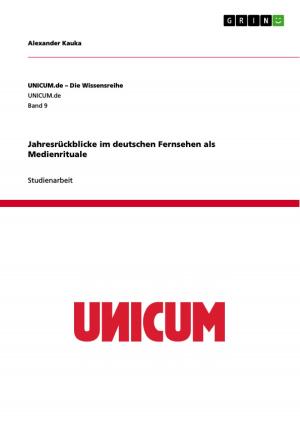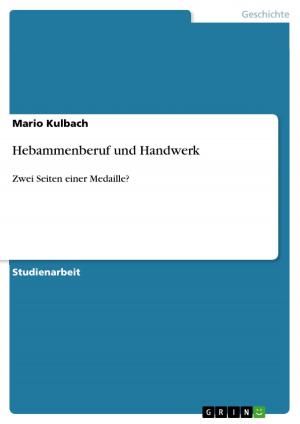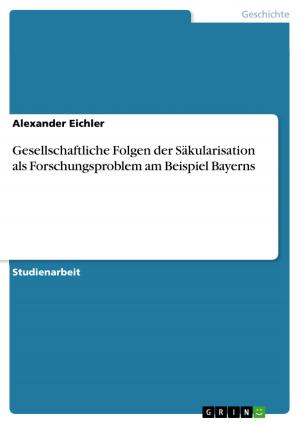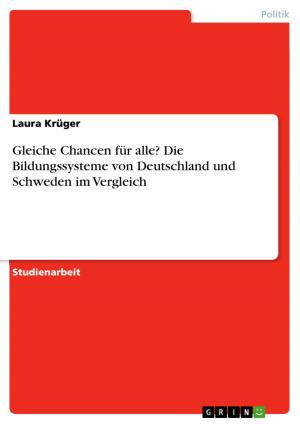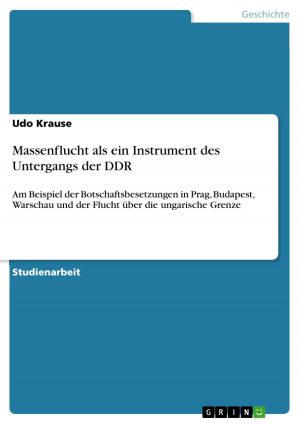| Author: | Franziska Caesar | ISBN: | 9783656399100 |
| Publisher: | GRIN Verlag | Publication: | April 2, 2013 |
| Imprint: | GRIN Verlag | Language: | English |
| Author: | Franziska Caesar |
| ISBN: | 9783656399100 |
| Publisher: | GRIN Verlag |
| Publication: | April 2, 2013 |
| Imprint: | GRIN Verlag |
| Language: | English |
Seminar paper from the year 2013 in the subject Cultural Studies - European Studies, grade: 1,0, Jagiellonian University in Krakow (European Studies ), course: Transformation of Collective Identity, language: English, abstract: Content Introduction .............................................................................................. 3 1. Germany and its Turkish Migrants ..................................................................................4 2. Meaning of Collective Identity.............................................................................................7 3. Features of Collective Identity of Turkish Migrants .....................................................10 Conclusion ..............................................................................................................................13 Bibliography .............................................................................................15 Introduction Over 50 years ago, the first so-called 'guest-workers' from Turkey arrived in Germany. Back then, it was neither expected that so many of them would stay and bring their families with them, nor what consequences the unprecedented influx of Turkish migrants would have. Meanwhile, Germany emerged from a guest-worker country in the 60s via a reluctant country of immigration in the 80s and 90s through to a country officially dedicated to immigration in the last decade. It was not until 2004, that Germany acknowledged its de-facto status as country of immigration and that political engagement to integrate migrants was emphasized. The importance of successful integration becomes self-evident when regarding the failures in the past, as highly considered former chancellor Helmut Schmidt criticized: 'For a long time, Germans have not grasped the problem of integration. [...]. We haven't done a good job.' Integration is on daily debate now. Fierce violence at the Rütli School in Berlin-Neukölln, which marks the biggest Turkish district outside Turkey, discrimination and disadvantages in daily life testify the huge gap between requests towards immigrants to integrate and at the same time the conditions for them to do so. It further shows that the children of former guest-workers, their children's children have long become a part of our society and must be regarded as such. However, they still feel alien in their own country, it might not be as a foreigners but as strangers. These problems of identity count in particular for Turkish migrants in Germany or people with Turkish migratory background. With almost 3 million people in 2011 , they form the biggest migrant group in Germany and are supposed to show the most obvious differences in contrast to a German 'Leitkultur'...
Seminar paper from the year 2013 in the subject Cultural Studies - European Studies, grade: 1,0, Jagiellonian University in Krakow (European Studies ), course: Transformation of Collective Identity, language: English, abstract: Content Introduction .............................................................................................. 3 1. Germany and its Turkish Migrants ..................................................................................4 2. Meaning of Collective Identity.............................................................................................7 3. Features of Collective Identity of Turkish Migrants .....................................................10 Conclusion ..............................................................................................................................13 Bibliography .............................................................................................15 Introduction Over 50 years ago, the first so-called 'guest-workers' from Turkey arrived in Germany. Back then, it was neither expected that so many of them would stay and bring their families with them, nor what consequences the unprecedented influx of Turkish migrants would have. Meanwhile, Germany emerged from a guest-worker country in the 60s via a reluctant country of immigration in the 80s and 90s through to a country officially dedicated to immigration in the last decade. It was not until 2004, that Germany acknowledged its de-facto status as country of immigration and that political engagement to integrate migrants was emphasized. The importance of successful integration becomes self-evident when regarding the failures in the past, as highly considered former chancellor Helmut Schmidt criticized: 'For a long time, Germans have not grasped the problem of integration. [...]. We haven't done a good job.' Integration is on daily debate now. Fierce violence at the Rütli School in Berlin-Neukölln, which marks the biggest Turkish district outside Turkey, discrimination and disadvantages in daily life testify the huge gap between requests towards immigrants to integrate and at the same time the conditions for them to do so. It further shows that the children of former guest-workers, their children's children have long become a part of our society and must be regarded as such. However, they still feel alien in their own country, it might not be as a foreigners but as strangers. These problems of identity count in particular for Turkish migrants in Germany or people with Turkish migratory background. With almost 3 million people in 2011 , they form the biggest migrant group in Germany and are supposed to show the most obvious differences in contrast to a German 'Leitkultur'...

